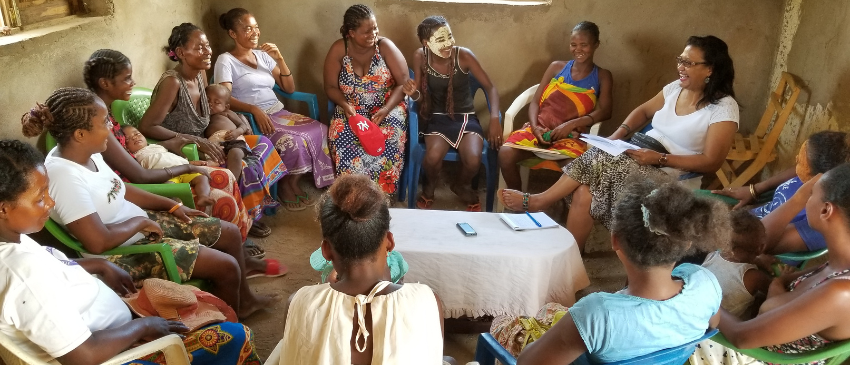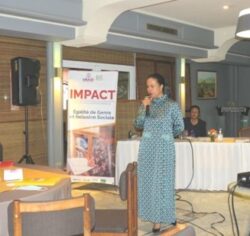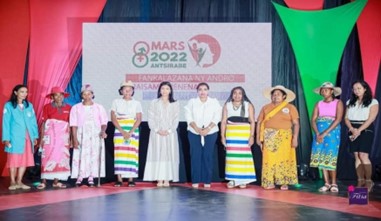
Partnering Together: How Local Women’s Organizations Contribute to Improved Health Outcomes in Madagascar
Many people in Madagascar do not have access to essential, high-quality medicine and health care products. While there are a number of pharmacies, drug shops and other health commodity providers, their capacity varies, and most pharmacies are concentrated in the capital, Antananarivo. Distribution is uneven, and stocks of drugs and medical supplies often run low, especially in remote and difficult-to-reach areas. This problem was only exacerbated by the COVID-19 pandemic.
Women and girls are disproportionately affected by these challenging conditions. In Madagascar, only 50 percent of women, ages 15-49, use contraception[1]. Unwed pregnant or sexually active teen girls may face social stigma or lack information and are therefore less likely to seek health services or use family planning methods, especially if the health providers are not adequately trained to meet their needs.
As part of the United States Agency for International Development (USAID) Improving Market Partnerships and Access to Commodities Together (IMPACT) program (2018-2023), Banyan Global is helping address these challenges by strengthening the overall health commodity market in Madagascar. Under the IMPACT consortium led by Population Services International (PSI), Banyan Global leads IMPACT’s Gender Equality and Social Inclusion (GESI) component, ensuring that the program’s activities consider and address gender-based inequalities and constraints.
To improve the supply of, access to, and use of health commodities, it is important to engage women and gender equality advocates in the community. Women in Madagascar play key roles in family health and well-being, as those responsibilities tend to be seen as women’s duties. As decision-makers in the household, economic participants, and essential health workers, women have the potential to reach the most marginalized who may lack access to the health commodities market.

EFOI’s president presents at a December 2022 workshop to solicit input from partners and other stakeholders on a GESI training manual.
Banyan Global researched and developed IMPACT’s GESI Analysis and Action Plan, which recommended ways to develop this under-utilized potential. One key recommendation was to create strategic partnerships with local women’s organizations to ensure representation and promote the active engagement of women, girls, youth, and other historically marginalized groups. The partnerships focus on health advocacy efforts, policy, and decision-making spaces to contribute to more equitable interventions and improved health outcomes. Banyan Global supported IMPACT to establish partnerships with two local organizations: the National Council of Women in Madagascar (Conseil National des Femmes de Madagascar or CNFM) and Women Entrepreneurs of the Indian Ocean (Entreprendre au Féminin Océan Indien or EFOI). These partnerships help to advocate for the inclusion of women, girls, and youth as active participants in the implementation of the project.
Through the partnerships’ extensive external networks, Banyan Global has supported IMPACT to conduct awareness-raising activities on International Women’s Day, World Contraception Day, and the 16 Days of Activism Against Gender-Based Violence. The program disseminates newspaper articles, factsheets, flyers, videos, and SMS messaging related to gender-based violence, women’s access to finance, and the link between gender and health. The Banyan Global GESI team also developed key messages for family planning and maternal and child health awareness campaigns. The messages promoted everyone’s right to family planning commodities and services and encouraged men to be involved, as supportive partners in family planning. By raising awareness, the campaigns helped to address misconceptions about contraception and gender norms.

The First Lady of Madagascar with two IMPACT representatives and other presenters in Antsirabe for International Women’s Day, March 2022.
The partnerships have created an opportunity for organizations to expand their reach and further their mission for gender equality. Estelle Randrasoa Andriamasy, the president of CNFM, noted, “This partnership provides an important opportunity to reach more rural women and to increase women’s economic empowerment. This partnership with IMPACT is a holistic process, and we see the transformation in the mindset of our members.”
Additionally, Banyan Global works to ensure that GESI issues are being considered in key government meetings and working groups. In 2021, IMPACT worked with its GESI partners to co-develop and facilitate a workshop for women leaders and entrepreneurs introducing key GESI concepts and their linkages to health issues. The sessions also increased participant awareness of health rights and contraceptive methods by reviewing health laws in Madagascar and discussing real-life challenges and scenarios. Thirty-five women leaders and entrepreneurs representing 23 associations with more than 2,000 members across five regions of Madagascar attended the workshop.
Banyan Global conducted research and produced IMPACT’s Gender Equality and Social Inclusion Analysis and Action Plan. The study found that men and women value health differently. Health is seen as a woman’s duty, and men typically do not take responsibility for ensuring their own health or the health of sick family members. Further, focus group discussions revealed that very few men use condoms as a form of birth control despite their wide visibility and availability. To address this issue, Banyan Global integrated gender-sensitive messages into various IMPACT communication campaigns such as—“Men, you have family planning options. Visit a health provider today to learn more and check your local pharmacy or drug shop to get your suitable method.”—to help shift community perspectives and encourage more gender equity in family planning.
By building gender awareness in policy spaces, Banyan Global and its partners helped integrate the voices of women, girls, and youth in government decision-making processes. More specifically, health commodities stakeholders and policymakers are now equipped with the tools to better identify gender-related challenges in health care and work towards transformative results, improving the health supply chain and overall health quality for women, girls, and all people across Madagascar.
As the IMPACT program winds down, local women’s organizations can continue to support better access to medicines and health commodities. Banyan Global is proud of our work to establish the framework for sustainable improvements in access to quality health care for all people in Madagascar.
[1] Madagascar Demographic and Health Survey 2021
